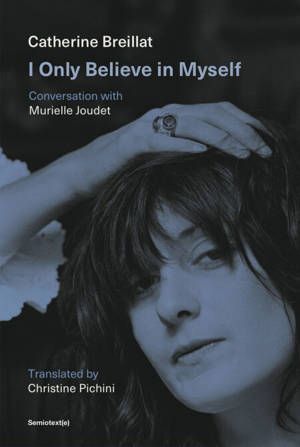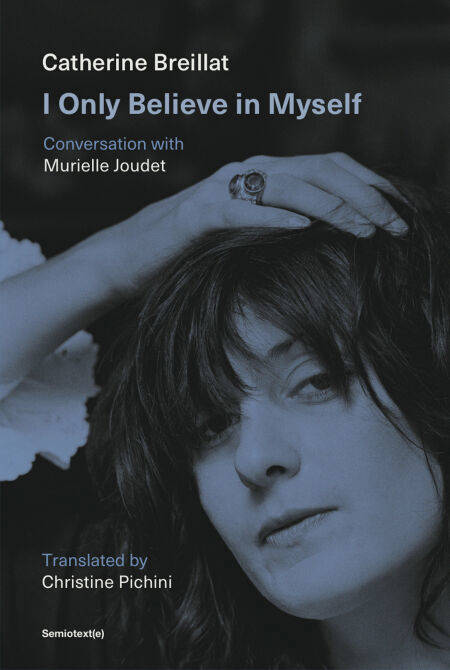
- Afhalen na 1 uur in een winkel met voorraad
- Gratis thuislevering in België vanaf € 30
- Ruim aanbod met 7 miljoen producten
- Afhalen na 1 uur in een winkel met voorraad
- Gratis thuislevering in België vanaf € 30
- Ruim aanbod met 7 miljoen producten
Zoeken
I Only Believe in Myself E-BOOK
Conversation with Murielle Joudet
Catherine Breillat, Murielle Joudet
€ 17,69
+ 17 punten
Uitvoering
Omschrijving
A long-form dialogue—on cinema and survival—with the visionary French filmmaker.
The virtuous always engage in a pseudoreligious morality. But there’s one thing they never say: the desire for pleasure is thought in motion. It’s what makes you transfigure a dull and repetitive sexual act into something that can bring you to ecstasy and an idea of eternity ...
—Catherine Breillat to Murielle Joudet
Catherine Breillat has always told just one story: her own, the story of a young girl whose existence was forbidden, who was, from childhood, cut in half, split between her mind and her sexuality, marked by the shame of being born female. She became a filmmaker at a time when choosing that vocation meant disobeying the world.
During six months between September 2022 and March 2023, the film critic Murielle Joudet interviewed Catherine Breillat for thirty hours, often following up with further discussion over the phone. Joudet and Breillat discuss each of her films in chronological order, moving freely between Breillat’s cinematic vision, her life, and the situations, artworks, and thought that have inspired her films.
From A Real Young Girl (1975) to Last Summer (2023), Breillat has made films in an attempt to recover what she believes was stolen from her— the “unfilmable,” inexhaustible grey area of the feminine where shame, transgression, sensuality, disgust, and the search for oneself intertwine until they become indistinguishable. Her work proposes a haunting imperative to know oneself ... and for her heroines, this spiritual search plays out as an open war with the opposite sex.
A conversation with Catherine Breillat is as much a cinema master class as it is a lesson in survival.
The virtuous always engage in a pseudoreligious morality. But there’s one thing they never say: the desire for pleasure is thought in motion. It’s what makes you transfigure a dull and repetitive sexual act into something that can bring you to ecstasy and an idea of eternity ...
—Catherine Breillat to Murielle Joudet
Catherine Breillat has always told just one story: her own, the story of a young girl whose existence was forbidden, who was, from childhood, cut in half, split between her mind and her sexuality, marked by the shame of being born female. She became a filmmaker at a time when choosing that vocation meant disobeying the world.
During six months between September 2022 and March 2023, the film critic Murielle Joudet interviewed Catherine Breillat for thirty hours, often following up with further discussion over the phone. Joudet and Breillat discuss each of her films in chronological order, moving freely between Breillat’s cinematic vision, her life, and the situations, artworks, and thought that have inspired her films.
From A Real Young Girl (1975) to Last Summer (2023), Breillat has made films in an attempt to recover what she believes was stolen from her— the “unfilmable,” inexhaustible grey area of the feminine where shame, transgression, sensuality, disgust, and the search for oneself intertwine until they become indistinguishable. Her work proposes a haunting imperative to know oneself ... and for her heroines, this spiritual search plays out as an open war with the opposite sex.
A conversation with Catherine Breillat is as much a cinema master class as it is a lesson in survival.
Specificaties
Betrokkenen
- Auteur(s):
- Vertaler(s):
- Uitgeverij:
Inhoud
- Aantal bladzijden:
- 224
- Taal:
- Engels
- Reeks:
Eigenschappen
- Productcode (EAN):
- 9781635902624
- Verschijningsdatum:
- 20/10/2025
- Uitvoering:
- E-book
- Beveiligd met:
- Adobe DRM
- Formaat:
- ePub

Alleen bij Standaard Boekhandel
+ 17 punten op je klantenkaart van Standaard Boekhandel
Beoordelingen
We publiceren alleen reviews die voldoen aan de voorwaarden voor reviews. Bekijk onze voorwaarden voor reviews.








